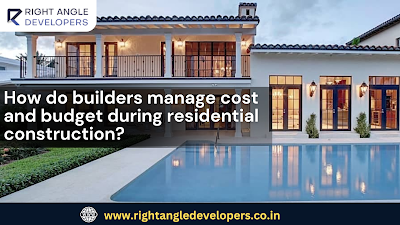How do builders manage cost and budget during residential construction?
Introduction:
Management of costs and budgets is one of the most critical steps in residential construction To achieve success, builders must follow a few essential guidelines: strategic planning, transparent communication, value engineering, vendor negotiation, contingency planning, technology integration, efficient resource allocation, continuous monitoring and adjustment, quality control, and post-construction analysis.
Strategic planning:
Builders must engage in strategic planning before laying a brick or raising a beam. This planning begins with estimating the costs of materials, labor, permits, and any other expenses that may arise. By creating a comprehensive budget from the outset, builders set the stage for a smoother construction process.
Value Engineering:
Value engineering:
Value engineering is a technique that builders use to maximize value by identifying opportunities for cost savings without compromising quality. This may involve exploring alternative materials or streamlining construction processes. Similarly, negotiating favorable terms with vendors and subcontractors can help secure competitive pricing for materials and labor, thus driving down overall project costs.
Vendor Negotiation:
Despite careful planning, unforeseen circumstances may arise during construction that impact the budget. Savvy builders always include a contingency fund in their budget to account for such contingencies. This buffer provides a safety net against unexpected expenses, ensuring that the project stays on track financially.
Contingency Planning:
Technology plays a crucial role in cost management in residential construction. Builders leverage construction management software, project management tools, and Building Information Modeling (BIM) to streamline processes, track expenses in real time, and identify areas for cost optimization.
Technology Integration:
In the present era of digitalization, technology has become a crucial aspect of cost management in residential construction. Builders are using construction management software, project management tools, and Building Information Modeling (BIM) to simplify processes, monitor expenses in real time, and identify opportunities for cost optimization.
Efficient Resource Allocation:
Optimal resource allocation is key to keeping costs in check during residential construction. Builders carefully plan the allocation of manpower, equipment, and materials to minimize waste and maximize productivity. By optimizing resource utilization, builders can achieve significant cost savings throughout a project.
Continuous Monitoring and Adjustment:
Cost management is not a one-time endeavor but a continuous process that requires vigilance and adaptability. Builders monitor project expenses closely throughout the construction process, comparing actual costs to budgeted amounts and making adjustments as needed to ensure financial objectives are met.
Quality Control:
While cost management is primarily focused on controlling expenses, builders must never lose sight of the importance of quality. Cutting corners to save costs can ultimately lead to costly rework and damage to reputation. By maintaining stringent quality control standards, builders deliver superior results that stand the test of time.
Post-Construction Analysis:
Once the construction process is complete, builders conduct a post-construction analysis to evaluate the project's financial performance. By reviewing actual costs against budgeted amounts and identifying lessons learned, builders gain valuable insights that inform future cost management strategies.
Conclusion:
Mastering cost management in residential construction requires a combination of strategic planning, transparent communication, value engineering, and technological innovation. By employing these tactics, builders can navigate the complexities of budgeting with confidence, delivering exceptional results while keeping costs in check. After all, in the world of residential construction, the art of managing costs is as essential as the craft of building itself.
More Information :
Call Us: +91 8088900660
Mail Us: info@rightangledevelopers.co.in
Website: https://www.rightangledevelopers.co.in/




Comments
Post a Comment